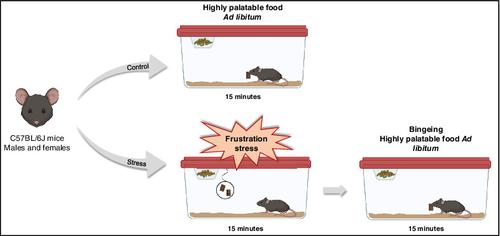当前位置:
X-MOL 学术
›
Genes Brain Behav.
›
论文详情
Our official English website, www.x-mol.net, welcomes your
feedback! (Note: you will need to create a separate account there.)
A model of emotional stress-induced binge eating in female mice with no history of food restriction.
Genes, Brain and Behavior ( IF 2.4 ) Pub Date : 2019-10-23 , DOI: 10.1111/gbb.12613 Roberta G Anversa 1, 2 , Erin J Campbell 1 , Sarah S Ch'ng 1 , Andrea Gogos 1, 2 , Andrew J Lawrence 1, 2 , Robyn M Brown 1, 2
Genes, Brain and Behavior ( IF 2.4 ) Pub Date : 2019-10-23 , DOI: 10.1111/gbb.12613 Roberta G Anversa 1, 2 , Erin J Campbell 1 , Sarah S Ch'ng 1 , Andrea Gogos 1, 2 , Andrew J Lawrence 1, 2 , Robyn M Brown 1, 2
Affiliation

|
Overeating is a major contributing factor to obesity and related health complications. For women, in particular, negative emotions such as stress strongly influence eating behavior and bingeing episodes. Modeling this type of binge eating in rodents presents challenges: firstly, stress-induced anorexia is commonly observed in rodents therefore a mild stressor is required in order to observe an orexigenic effect. Second, many studies report using calorie restriction to observe the required behavior; yet this does not necessarily reflect the human condition. Thus, the aim of this study was to develop a model of emotional stress-induced bingeing independent of caloric restriction. Female and male C57BL/6J mice were divided into ad libitum (n = 20 per sex) and food-restricted (n = 20 per sex) groups which were both further split into a control group and a group exposed to frustration stress (n = 10 per group). All mice were provided intermittent access to a highly palatable food in 2 cycles. At the end of each cycle the stress group was subjected to a 15-minute frustration episode where highly palatable food was within the home cage but inaccessible. Both groups were then given free access for 15 minutes. Frustrated female mice from the ad libitum displayed binge-like behavior compared with controls (P = .0001). Notably, this behavior was absent in males. Ovariectomy had no impact on binge-like behavior. Collectively, these data validate a novel model of emotional stress-induced binge eating specific to female mice which does not require caloric restriction and is not driven by ovarian hormones.
中文翻译:

没有食物限制史的雌性小鼠情绪应激诱发的暴饮暴食模型。
暴饮暴食是肥胖和相关健康并发症的主要因素。特别是对于女性而言,诸如压力之类的负面情绪会强烈影响饮食行为和暴饮暴食。在啮齿动物中模拟这种暴食饮食提出了挑战:首先,在啮齿动物中通常会观察到压力引起的厌食,因此需要轻度的压力刺激物才能观察到致食作用。其次,许多研究报告使用卡路里限制来观察所需的行为。但这并不一定反映人类的状况。因此,本研究的目的是建立一种独立于热量限制的情绪应激引起的暴饮暴食的模型。将雌性和雄性C57BL / 6J小鼠分为随意(n = 20 /每性别)和食物受限(n = 20 /每性别)组,将它们进一步分为对照组和暴露于沮丧压力下的一组(n =每组10个)。在2个周期中,为所有小鼠间歇性地提供了高度可口的食物。在每个周期的末尾,压力组会遭受15分钟的挫折感发作,在这个笼子里有非常可口的食物,但是难以接近。两组都可以免费使用15分钟。与对照相比,随意随意沮丧的雌性小鼠表现出暴食样的行为(P = .0001)。值得注意的是,这种行为在男性中是不存在的。卵巢切除术对暴饮暴食行为没有影响。总的来说,
更新日期:2020-03-27
中文翻译:

没有食物限制史的雌性小鼠情绪应激诱发的暴饮暴食模型。
暴饮暴食是肥胖和相关健康并发症的主要因素。特别是对于女性而言,诸如压力之类的负面情绪会强烈影响饮食行为和暴饮暴食。在啮齿动物中模拟这种暴食饮食提出了挑战:首先,在啮齿动物中通常会观察到压力引起的厌食,因此需要轻度的压力刺激物才能观察到致食作用。其次,许多研究报告使用卡路里限制来观察所需的行为。但这并不一定反映人类的状况。因此,本研究的目的是建立一种独立于热量限制的情绪应激引起的暴饮暴食的模型。将雌性和雄性C57BL / 6J小鼠分为随意(n = 20 /每性别)和食物受限(n = 20 /每性别)组,将它们进一步分为对照组和暴露于沮丧压力下的一组(n =每组10个)。在2个周期中,为所有小鼠间歇性地提供了高度可口的食物。在每个周期的末尾,压力组会遭受15分钟的挫折感发作,在这个笼子里有非常可口的食物,但是难以接近。两组都可以免费使用15分钟。与对照相比,随意随意沮丧的雌性小鼠表现出暴食样的行为(P = .0001)。值得注意的是,这种行为在男性中是不存在的。卵巢切除术对暴饮暴食行为没有影响。总的来说,











































 京公网安备 11010802027423号
京公网安备 11010802027423号